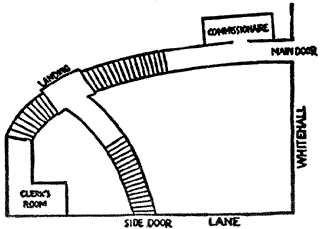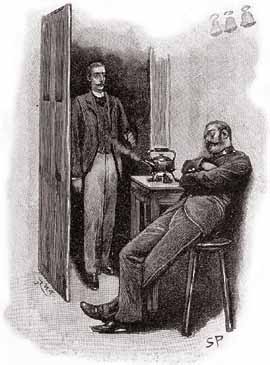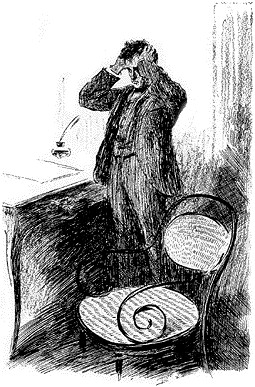“I did exactly what he indicated and waited until the other clerks had departed. One of them in my room, Charles Gorot, had some arrears of work to make up, so I left him there and went out to dine. When I returned he was gone. I was anxious to hurry my work, for I knew that Joseph – the Mr. Harrison whom you saw just now – was in town, and that he would travel down to Woking by the eleven-o’clock train, and I wanted if possible to catch it. | 「私は正確に叔父の指示どおりにし / 他の事務員が帰るまで待ちました◆私の部屋にいた一人 / チャールズ・ゴロットは / 仕事を終わらせるにちょっと遅くなったので / 私は彼を残して外に出て食事をとりました◆私が帰ってきた時彼はいませんでした◆私は急いで仕事をやり遂げたくてたまりませんでした / なぜならジョセフが / / さっきお会いになったハリソンさんが / / この町にいたからです / そして彼はウォーキングに帰るはずでした / 十一時の列車で / なので私は出来るならその列車に乗りたいと思っていました」 |
“When I came to examine the treaty I saw at once that it was of such importance that my uncle had been guilty of no exaggeration in what he said. Without going into details, I may say that it defined the position of Great Britain towards the Triple Alliance, and foreshadowed the policy which this country would pursue in the event of the French fleet gaining a complete ascendency over that of Italy in the Mediterranean. The questions treated in it were purely naval. At the end were the signatures of the high dignitaries who had signed it. I glanced my eyes over it, and then settled down to my task of copying. | 「私が条約を確かめだした時 / 私はすぐに分かりました / この文章は非常に重要で / 叔父が言った事は全く誇張ではなかったと◆詳しくは申し上げませんが / こういっておきましょう / 三国同盟に関するイギリスの立場を定めているものでした / そしてイギリスが取る政策を予告するものでした / フランス艦隊が完全に優位にたった場合に / イタリアの艦隊に対して、 / 地中海において◆条約が取り決めているのは純粋に海軍の問題でした◆文書の末尾には / 批准した高官たちのサインがありました◆私はざっと目を通し / それから複写する仕事にとりかかりました」 |
“It was a long document, written in the French language, and containing twenty-six separate articles. I copied as quickly as I could, but at nine o’clock I had only done nine articles, and it seemed hopeless for me to attempt to catch my train. I was feeling drowsy and stupid, partly from my dinner and also from the effects of a long day’s work. A cup of coffee would clear my brain. A commissionaire remains all night in a little lodge at the foot of the stairs and is in the habit of making coffee at his spirit-lamp for any of the officials who may be working overtime. I rang the bell, therefore, to summon him. | 「それは長い文書でした / フランス語で書かれ / 二十六箇条ありました◆私は出来る限り急いで筆写しました / しかし、九時になっても私は九条書き写しただけでした / そして思っていた列車に乗ろうという試みは見込みがないように思えました◆私は眠くなり頭がぼんやりしてきました / いくらかは夕食のせいですが / 長い昼間の仕事の疲れもありました◆コーヒーを一杯飲めば頭がすっきりするだろう◆一晩中、便利屋が一人残っていて / 階段の一番下の小さな部屋に / アルコールランプでコーヒーを作る習慣になっていました / 残業する職員誰でもに◆だから、私はベルを鳴らして彼を呼びました」 |
“To my surprise, it was a woman who answered the summons, a large, coarse-faced, elderly woman, in an apron. She explained that she was the commissionaire’s wife, who did the charing, and I gave her the order for the coffee. | 「驚いた事に / 私の呼び出しにやってきたのは女性でした / 背の高い、がさつな顔つきの、歳とった女でした / エプロンを着ていました◆彼女は便利屋の嫁で雑用をしていると自己紹介しました / それで私は彼女にコーヒーを頼みました」 |
“I wrote two more articles, and then, feeling more drowsy than ever, I rose and walked up and down the room to stretch my legs. My coffee had not yet come, and I wondered what the cause of the delay could be. Opening the door, I started down the corridor to find out. There was a straight passage, dimly lighted, which led from the room in which I had been working, and was the only exit from it. It ended in a curving staircase, with the commissionaire’s lodge in the passage at the bottom. Halfway down this staircase is a small landing, with another passage running into it at right angles. This second one leads by means of a second small stair to a side door, used by servants, and also as a short cut by clerks when coming from Charles Street. Here is a rough chart of the place.” | 「私は次の二条書き写しました / その後 / さらに眠くなり / 立ち上がって足を伸ばすために部屋を行ったり来たりしました◆頼んだコーヒーはまだ来ていません / 私はなぜこんなにコーヒーが遅いのか不思議に思っていました◆扉を開け / 私は理由を知るために廊下を歩き始めました◆薄暗い照明がある真っ直ぐな廊下があり / 私が働いていた部屋から続いている / これは部屋からのただ一つの出口でした◆突き当たりは曲がった階段になっていて / それを降りると便利屋の部屋がある通路になっています◆階段を半分降りたところが踊り場になっていて / 直角に別の道があります◆この二番目の道は / 横扉に続く小さな階段に繋がっていて / 使用人が使っています / また、チャールズ街から来る事務員の近道にもなっています◆これがその場所の簡単な図です」 |
 | |
“Thank you. I think that I quite follow you,” said Sherlock Holmes. | 「ありがとう◆よく分かります」 / ホームズは言った |
“It is of the utmost importance that you should notice this point. I went down the stairs and into the hall, where I found the commissionaire fast asleep in his box, with the kettle boiling furiously upon the spirit-lamp. I took off the kettle and blew out the lamp, for the water was spurting over the floor. Then I put out my hand and was about to shake the man, who was still sleeping soundly, when a bell over his head rang loudly, and he woke with a start. | 「この点に注意するのが非常に重要なのです◆私は階段を降りてホールに出ました / そこで便利屋が自分の部屋でぐっすりと眠っているのを見つけました / アルコールランプの上でヤカンの湯が激しく煮え立っています◆私はヤカンを持ち上げてランプを吹き消しました / 湯が床に吹きこぼれていたので◆そして手を伸ばして男を揺り動かそうとした時 / 彼はまだぐっすり寝ていましたが / 頭の上のベルがけたたましく鳴りました / それで彼はびっくりして飛び起きました」 |
 | |
“ ‘Mr. Phelps, sir!’ said he, looking at me in bewilderment. | 「『フェルプスさん!』 / 彼は言いました / 私を当惑して見ながら」 |
“ ‘I came down to see if my coffee was ready.’ | 「『コーヒーが出来たか見に降りてきたんだ』」 |
“ ‘I was boiling the kettle when I fell asleep, sir.’ He looked at me and then up at the still quivering bell with an ever-growing astonishment upon his face. | 「『お湯を沸かしている間に眠ってしまいました』 / 彼は私を見、それからまだ揺れているベルを見上げました / 彼はどんどんと驚いた顔になってきました」 |
“ ‘If you was here, sir, then who rang the bell?’ he asked. | 「『あなたがここにいらっしゃるのなら / 誰がベルを鳴らしたんでしょう?』 / 彼は尋ねた」 |
“ ‘The bell!’ I cried. ‘What bell is it?’ | 「『ベル!』 / 私は叫びました◆『あれは何のベルだ?』」 |
“ ‘It’s the bell of the room you were working in.’ | 「『あなたが働いていた部屋のベルです』」 |
“A cold hand seemed to close round my heart. Someone, then, was in that room where my precious treaty lay upon the table. I ran frantically up the stair and along the passage. There was no one in the corridors, Mr. Holmes. There was no one in the room. All was exactly as I left it, save only that the papers which had been committed to my care had been taken from the desk on which they lay. The copy was there, and the original was gone.” | 「心臓を冷たい手でつかまれたようでした◆では誰かが / 私が貴重な条約文書を残してきた部屋にいる◆私は死に物狂いで階段を駆け上がり廊下を走りました◆廊下には誰もいませんでした / ホームズさん◆部屋にも誰もいませんでした◆全ては私が部屋を後にした時のままでした / ただ、私が仕事をしてきた文書だけが / 置かれていた場所から持ち出されていました◆写しは残っていましたが / 原文が無くなっていました」 |
 | |
Holmes sat up in his chair and rubbed his hands. I could see that the problem was entirely to his heart. “Pray, what did you do then?” he murmured. | ホームズは椅子に座りなおして手を擦った◆彼がこの事件に対して完全に本気になったことが見て取れた◆「それからどうされたのですか?」 / 彼は小声で言った |